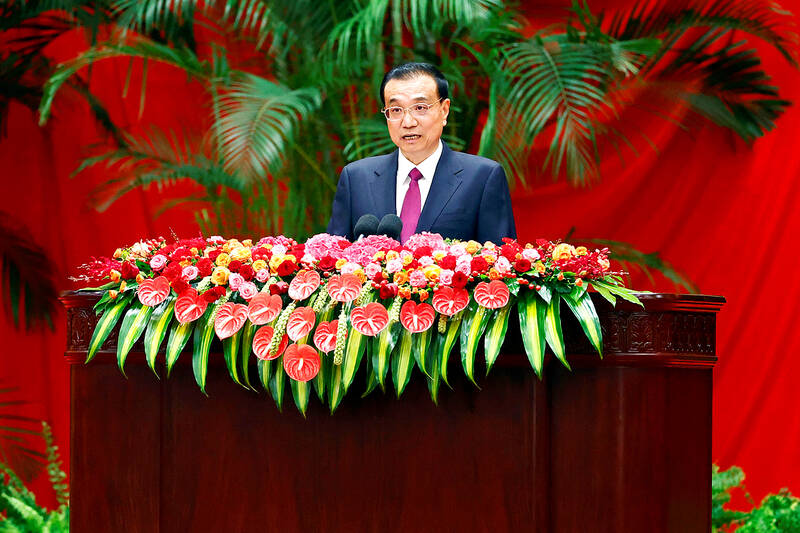Taiwan will never accept Beijing’s attempts to undermine its sovereignty, the Mainland Affairs Council (MAC) said yesterday, after the Chinese Communist Party (CCP) at its National Day celebrations in Beijing vowed to achieve unification with Taiwan.
The CCP’s statement was not conducive to peaceful cross-strait relations, the council said.
The event, hosted by the Chinese State Council, featured Chinese President Xi Jinping (習近平), Chinese Premier Li Keqiang (李克強), the other five CCP Politburo Standing Committee members and Vice President Wang Qishan (王岐山), as well as 500 guests from China and abroad.

Photo: REUTERS
Taiwanese based in China also attended the ceremony, Xinhua news agency said.
Li greeted “people of all ethnicities” in China, and extended “warmest regards” to “compatriots of Hong Kong, Macau, Taiwan and overseas.”
With regard to cross-strait relations, Li said it is imperative to implement the general strategies of the CPP to resolve the “Taiwan issue.”
China seeks to maintain and uphold the “one China” principle and the “1992 consensus” to oppose the “secession” of Taiwan, which is promoted from within Taiwan and by foreign entities seeking to meddle with China’s domestic affairs, Li said.
The council said the statement was an attempt to undermine the legitimacy and sovereignty of Taiwan.
“We will never accept such ideas,” it said.
The government is assessing whether Taiwanese attended the event, and urges Taiwanese not to become mouthpieces of the CCP and undermine Taiwan’s national interests, the council said.
Neither side of the Taiwan Strait “belongs” to the other, it said.
The council called on the CCP to respect the choices made by Taiwanese, saying that the international community strongly opposes Beijing’s attempts to disturb peace and the “status quo” across the Strait.
China’s National Day marks the anniversary of the proclamation of the People’s Republic of China on Oct. 1, 1949, before the then-Chinese Nationalist Party (KMT) government retreated to Taiwan.
China Central Television (CCTV) wished its followers on Sina Weibo a happy National Day, posting a picture with an “I Love You, China” slogan.
CELEBRITIES
The picture was quickly shared by the official social media accounts of China-friendly Taiwanese celebrities, including Ouyang Nana (歐陽娜娜), Rainie Yang (楊丞琳), Lin Chi-ling (林志玲), Jiro Wang (汪東城) and Janine Chang (張鈞甯), who added the phrase: “Best wishes for our fatherland, may it prosper and be strong.”
Lin’s post came after she in August was criticized by Chinese social media users after she did not repost a picture with the slogan “There is only one China” that was originally posted on the CCTV Web site in response to a Taiwan visit by US House of Representatives Speaker Nancy Pelosi.
The so-called “1992 consensus” — a term that former Mainland Affairs Council chairman Su Chi (蘇起) in 2006 admitted making up in 2000 — refers to a tacit understanding between the KMT and the Chinese Communist Party that both sides of the Taiwan Strait acknowledge there is “one China,” with each side having its own interpretation of what “China” means.

Taiwan is projected to lose a working-age population of about 6.67 million people in two waves of retirement in the coming years, as the nation confronts accelerating demographic decline and a shortage of younger workers to take their place, the Ministry of the Interior said. Taiwan experienced its largest baby boom between 1958 and 1966, when the population grew by 3.78 million, followed by a second surge of 2.89 million between 1976 and 1982, ministry data showed. In 2023, the first of those baby boom generations — those born in the late 1950s and early 1960s — began to enter retirement, triggering

ECONOMIC BOOST: Should the more than 23 million people eligible for the NT$10,000 handouts spend them the same way as in 2023, GDP could rise 0.5 percent, an official said Universal cash handouts of NT$10,000 (US$330) are to be disbursed late next month at the earliest — including to permanent residents and foreign residents married to Taiwanese — pending legislative approval, the Ministry of Finance said yesterday. The Executive Yuan yesterday approved the Special Act for Strengthening Economic, Social and National Security Resilience in Response to International Circumstances (因應國際情勢強化經濟社會及民生國安韌性特別條例). The NT$550 billion special budget includes NT$236 billion for the cash handouts, plus an additional NT$20 billion set aside as reserve funds, expected to be used to support industries. Handouts might begin one month after the bill is promulgated and would be completed within

NO CHANGE: The TRA makes clear that the US does not consider the status of Taiwan to have been determined by WWII-era documents, a former AIT deputy director said The American Institute in Taiwan’s (AIT) comments that World War-II era documents do not determine Taiwan’s political status accurately conveyed the US’ stance, the US Department of State said. An AIT spokesperson on Saturday said that a Chinese official mischaracterized World War II-era documents as stating that Taiwan was ceded to the China. The remarks from the US’ de facto embassy in Taiwan drew criticism from the Ma Ying-jeou Foundation, whose director said the comments put Taiwan in danger. The Chinese-language United Daily News yesterday reported that a US State Department spokesperson confirmed the AIT’s position. They added that the US would continue to

The National Development Council (NDC) yesterday unveiled details of new regulations that ease restrictions on foreigners working or living in Taiwan, as part of a bid to attract skilled workers from abroad. The regulations, which could go into effect in the first quarter of next year, stem from amendments to the Act for the Recruitment and Employment of Foreign Professionals (外國專業人才延攬及僱用法) passed by lawmakers on Aug. 29. Students categorized as “overseas compatriots” would be allowed to stay and work in Taiwan in the two years after their graduation without obtaining additional permits, doing away with the evaluation process that is currently required,